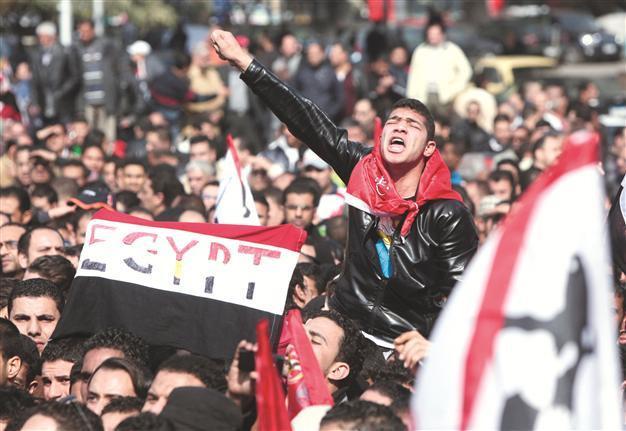Egyptian rivals Al Ahly, Zamalek, unite against military rulers again
James M. Dorsey Hürriyet Daily News

An Egyptian football fan shouts anti-ruling
military council slogans during a protest at the Sphinx square in Cairo after the Port Said
stampede. AP Photo
Fans of Cairo’s biggest footballing rivals have banded together again to warn
Egypt’s military rulers that they will “sacrifice their lives” to achieve justice after 74 supporters were killed in stadium violence last month.
The fans of Al-Ahly SC and Zamalek SC have also warned the military that they will resist a crackdown on militant
football groups.
Coming from Zamalek’s Ultras White Knights (UWK) and Ultras Ahlawy – both militant, well-organized, highly politicized football fan groups that have been hardened by street battles and played a key role in last year’s overthrow of president Hosni Mubarak – these are not empty threats.
The statement at the end of a historic meeting between the two groups who have bitterly fought each other since their inception in 2007 suggests a sea change in Egypt’s football politics.
Arch rivals The arch rivals, whose differences are rooted in the contentious politics of British-ruled Egypt that led to their clubs’ founding more than a century ago, temporarily set their differences aside early last year to jointly confront security forces and Mubarak loyalists on Cairo’s Tahrir Square. Since the toppling of the president, they have stood should-to-shoulder in vicious street battles with law enforcement forces associated with the Interior Ministry in a bid to force the military to hand over power to a civilian government and return to its barracks.
A process of reconciliation between the rival ultras groups had started before the Port Said incident, in which 74 Al-Ahly supporters were killed in crowd violence, but was accelerated by a sense of being targeted by the government after the death of scores of their comrades.
UWK had called for a cease-fire with the Al-Ahly ultras in a statement on its Facebook page on the eve of the Port Said incident; Ultras Ahlawy responded with a smiley. Zamalek ultras subsequently paid an unprecedented visited to Al-Ahly after the incident to pay their respects to the dead.
The reconciliation is fueled by a process of introspection among the ultras sparked by Port Said as a result of which significant elements within the various groups are seeking to wrest back control from the thousands of young, often less educated, men who swelled their ranks in recent years. The newer recruits are frequently consumed with asserting their dignity by taking their revenge on security forces for what they perceive are years of abuse, violence and mistreatment during matches at grounds.
The ultras accuse the government and security forces of having enabled – if not encouraged – last month’s clash in the Port Said stadium after a match between the Suez Canal town’s Al-Masry SC and Al-Ahly to punish the Cairo ultras for emerging as the most militant opponents to military rule.
Egypt’s prosecutor general yesterday referred 75 people to criminal court in connection with the riots.
The defendants include nine members of the police and three officials from the Al-Masry football club.
Two minors will be sent to a children’s court, the prosecutor’s office said in a statement. “We demand full transparency in revealing the outcome of the investigations. We will neither accept disregarding the disaster and turning it into football riots nor making a scapegoat to protect those who orchestrated the attacks,” the ultras said in a joint statement.
Differences fading The ultras warned further that they would reject “wrongful accusations against anyone because he just belongs to the ultras groups” as well as efforts to suppress their groups. They also cautioned that they would “not allow any football activities to resume unless complete justice is done.”
Al-Ahly traces its roots of opposition to the government to when it was founded more than a century ago as a meeting place of opponents of the British colonial administration and the monarchy. Its players still wear the red colors of the pre-colonial Egyptian flag.
Dressed in white, Zamalek, was established as the club of the British colonial administrators, their Egyptian allies and the monarchists.
Those differences have long faded given that the monarchy was overthrown 60 years ago, and the demography of the two clubs’ fan base no longer reflects these differences. The rivalry, nonetheless, persisted with Cairo residents defining themselves as either Zamalek or Ahlawy until Mubarak’s overthrow.
